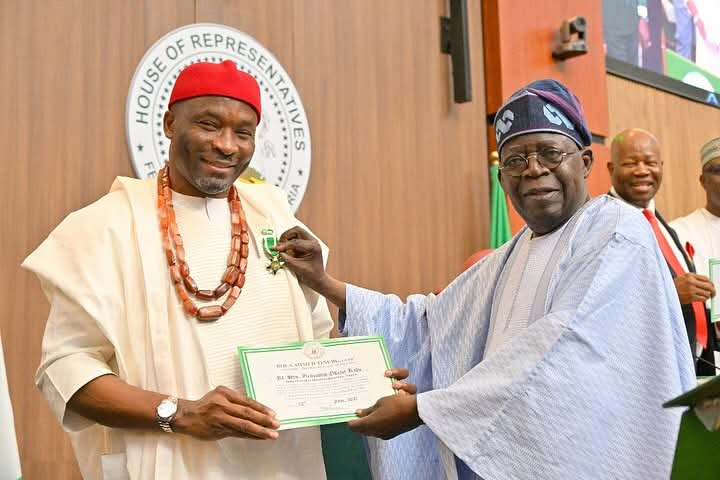Victor Ukaogo
In the ever-evolving landscape of Nigerian politics, few figures have emerged as both a beacon of hope and a source of contention as Benjamin Kalu.
As the current Deputy Speaker of the House of Representatives, Kalu has become a significant player in Nigeria’s political arena, often positioning himself against the entrenched interests of what many have come to label the “Yesterday Men.” This term refers to the older generation of politicians who cling to power and influence, often prioritizing personal gain over the collective good. Kalu’s rise represents a challenge to these established figures, as he seeks to carve out a new path for Nigeria’s future; particularly the youth and women.
Born on May 5, 1971, in Abia State, Benjamin Kalu has always been a figure of ambition and intellect. He studied law at the University of Calabar and later obtained several other degrees from diverse centers of learning across the world.
His legal background has equipped him with the tools necessary to navigate the complex political landscape of Nigeria. Kalu’s foray into national politics began in earnest when he was elected to the House of Representatives in 2019, representing the Bende Federal Constituency.
From the outset, Kalu distinguished himself as a reformist, advocating for transparency, accountability, and good governance. His commitment to these principles has resonated with a younger generation of Nigerians who are increasingly disillusioned with the status quo. Kalu’s ability to articulate the aspirations of this demographic class has made him a formidable opponent to the entrenched political elite.
The term or phenomenon of “Yesterday Men” encapsulates a group of politicians who have dominated Nigeria’s political landscape for decades. These individuals often resist change, clinging to outdated ideologies, formats and practices that have contributed to the country’s myriad challenges, including corruption, mismanagement, and a lack of accountability.
They are characterized by their reluctance to embrace new ideas and their tendency to prioritize personal interests over the welfare of the populace. They are many and varied across the country but some of the most vicious, petty and intolerant to the emergence and rise of the youth are domiciled in Abia state, Kalu’s home state that prides itself as God’s own state. And Kalu’s emergence as a political force and one of Nigeria’s 80 most influential politicians has posed a direct challenge to these figures.
His advocacy for reform and his willingness to demand change from ‘yesterday men’ and the status quo have made him a headache for these shadowy men with old formats of political strategizing.
They see him as a threat to their power and influence, and as such, they have often sought to undermine his efforts either by calling him a ‘small boy’ with no respect or a proud flippant without decorum.
Truth be told, at the heart of Benjamin Kalu’s political philosophy is a vision for a more equitable and just Nigeria. He believes that the country can only thrive if its leaders prioritize the needs of the people over their own interests.
Kalu has consistently advocated for policies that promote economic development, social justice, and good governance. His many bills in the parliament is a testimony and speaks to this reality. It will be difficult recalling Kalu’s legislative sagacity in this piece but one of Kalu’s key initiatives has been his focus on youth and women empowerment.
He recognizes that Nigeria’s youth represent a significant portion of the population and that their potential must be harnessed for the country’s progress. Kalu has championed various programs aimed at providing young people with the skills and opportunities they need to succeed.
The focus on youth has not only garnered him support among younger voters but has also positioned him as a forward-thinking leader in a country often mired in outdated formats and practices. The seat reservation bill for women in the National Assembly has gained momentum and only sheer mischief can scuttle it and the women with voting political relevance are watching.
The Backlash from the ‘Yesterday Men’ clearly shows that Kalu’s rise has not come without its challenges. The “Yesterday Men” have responded to his growing influence with a concerted effort to undermine his credibility and diminish his impact. This has included attempts to discredit his initiatives and portray him as an outsider and pupil-politician who does not understand the complexities of Nigerian politics.
One of the most significant tactics employed by these entrenched politicians has been the spread of misinformation. Kalu has faced numerous false accusations and smear campaigns aimed at tarnishing his reputation. These efforts are indicative of the lengths to which the “Yesterday Men” will go to protect their interests and maintain their grip or family grip on power. It must always be them, their brothers, siblings or blood relations.
They are blessed with the capacity to tell lies and recruit even more committed liars who wait till eternity to be rewarded. They claim to be astute politicians but double facedly, without shame or conscience engage in brazen anti-party activity hitherto unseen in Africa. With the application and deployment of ‘decoy politics’, they deceive the unwary pretending support by encouraging them to declare their political intentions to earn their support. Yet, such call reminiscent of what Prof. Jonah Onuoha would extract from his treatise on ‘Motor Park theory’ of politics.
Worse still, these ‘yesterday men’ arrogate divine political prowess to themselves and regularly drop names of influential politicians including the President they never supported to get to Aso Rock.
Nigerians are merely asking, when will you rest? Despite these challenges, Kalu has remained steadfast in his commitment to his vision for Nigeria. He has continued to engage with the public, using social media and other platforms to communicate directly with citizens and counter the narratives being pushed by his detractors.
The approach has helped him build a loyal following and has further solidified his position as a leader of the new generation. The test case being the social-media powered unveiling of the new Renewed Hope Partners initiative two weeks ago that shut down Abia state and switched many a-politician into jittery mode.
In an age where information spreads rapidly, social media has become a powerful tool for political engagement. Kalu has adeptly utilized platforms like Twitter, Facebook, and Instagram to connect with constituents and share his vision for Nigeria. His ability to communicate directly with the public has allowed him greater access to traditional media channels, which though are often dominated by the narratives of the ‘Yesterday Men’ but who have also become endeared to him for reasons of his charisma and openness.
Through social media, Kalu has been able to mobilize support for his initiatives and engage in meaningful conversations with Nigerians. He has used these platforms to highlight issues affecting his constituents, advocate for policy changes, and promote transparency in government.
This direct engagement has not only bolstered his popularity but has also positioned him as a leader who is in touch with the needs and aspirations of the people. As Benjamin Kalu continues to be a burden to ‘yesterday men’, the future of Nigerian politics hangs in the balance.
His rise represents a potential shift away from the entrenched interests of the “Yesterday Men” and towards a new generation of leaders who prioritize the needs of the populace.
Kalu’s vision for a more equitable and just Nigeria resonates with many, particularly the youth and women, who are eager for change. However, the road ahead is fraught with challenges. The “Yesterday Men” will not relinquish their power easily, and Kalu will need to navigate a complex political landscape filled with obstacles. His ability to build coalitions, engage with diverse stakeholders, and maintain public support will be crucial in the coming years.
Benjamin Kalu’s emergence as a political force in Nigeria represents a significant challenge to the entrenched interests of the “Yesterday Men.”
His commitment to reform, transparency, and youth empowerment has resonated with a generation eager for change. As he continues to confront the status quo, Kalu embodies the hope for a brighter future for Nigeria—a future where leaders prioritize the needs of the people over their own interests.
The battle between Kalu and the “Yesterday Men” is not just a political struggle; it is a reflection of the broader societal desire for progress and accountability.
As Nigeria navigates its complex political landscape, the outcome of this struggle will have far-reaching implications for the country’s future. Kalu’s journey is a testament to the power of resilience and the potential for change in a nation yearning for a new direction.

